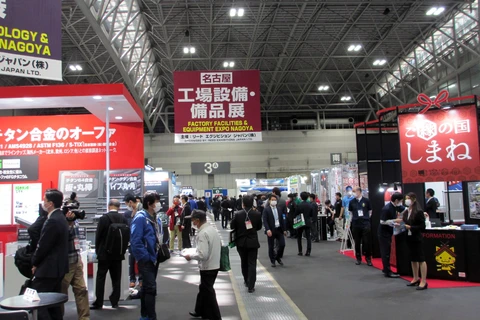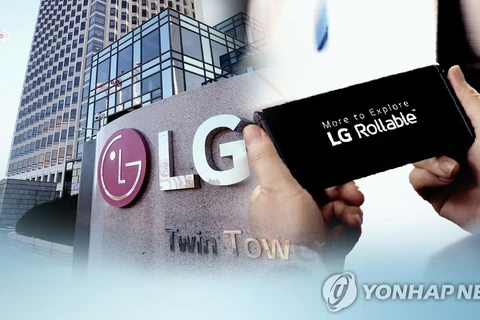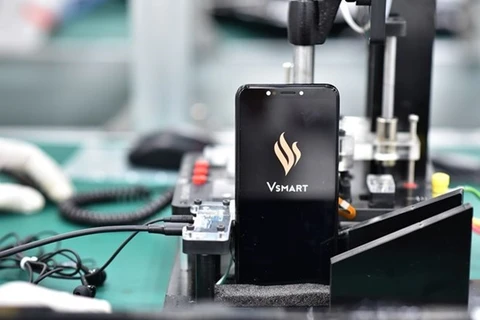Hanoi (VNS/VNA) - Before the latest withdrawal of Vinsmart, Japanese giants like Panasonic, Toshiba, and Sharp also dropped out of the Vietnamese television market.
Panasonic, Toshiba and Sharp televisions are no longer found at large electronics supermarket chains.
Online news outlet zing.vn quoted a Toshiba representative as saying that they had stopped selling televisions in Vietnam and focused on other household electronics products.
Panasonic also announced it would stop producing low-cost televisions at factories in India and Vietnam to cut costs and restructure its business operations at the beginning of this month.
Like Sharp, Panasonic sold only a few television models in Vietnam from 2018 and 2019 with old technology and at clearance sale prices.
Panasonic previously discontinued its plasma television line and closed television production lines in the US and China. It currently holds 1.8 percent of the global television market share, according to analysis firm Omdia, and is only making money from growth in the Japanese market.
Pham Van Tam, chairman of the board of directors of Asanzo, once assessed that the television is no longer a key product of electronic businesses. He said firms only launched new products to maintain market share and brand, most have shifted to refrigeration, water purification and air purification.
Most recently, Vingroup halted the production of TVs and smartphones to focus on the development of its internet-of-things and infotainment segments for VinFast cars.
"The production of smartphones and smart TVs (Vsmart) is no longer able to deliver breakthroughs and added-value for consumers.
"We have decided to instead invest in the development of smart vehicles, smart home and smart city solutions, areas in which we are confident we can deliver excellent customer experience and value," said Nguyen Viet Quang Vice Chairman and CEO of Vingroup.
Meanwhile, a representative of Sony Vietnam told Zing that the firm planned to focus on the large-screen television segment and compete based on technology and product quality.
Over the years, this company and other big names such as Samsung, LG and Chinese and Thai television brands like TCL, Mobell, Falcon, and Casper have launched many new products and technologies.
A representative of Samsung Vietnam said the company had outlined a strategy to maintain its leading position in the 8K market while diversifying the QLED product range and expanding the market for lifestyle television lines.
The latest report of research firm GfK said the three brands that led the television market in Vietnam were Samsung, Sony and LG by the end of the third quarter of last year. Of which, Samsung accounted for the largest market share at up to 44.7 percent.
However, while Samsung and LG have increased their market share by 1-5 percent each year since 2018, Sony's market share is gradually getting smaller, from 32.6 percent in 2018 to 25.9 percent at the end of September last year.
This report also showed that the large screen television market at 55 inches and above tended to grow strongly despite the COVID-19 pandemic.
Vietnamese consumers bought 919,300 televisions in this segment by the end of September last year, up 29 percent compared to 2017./.
Panasonic, Toshiba and Sharp televisions are no longer found at large electronics supermarket chains.
Online news outlet zing.vn quoted a Toshiba representative as saying that they had stopped selling televisions in Vietnam and focused on other household electronics products.
Panasonic also announced it would stop producing low-cost televisions at factories in India and Vietnam to cut costs and restructure its business operations at the beginning of this month.
Like Sharp, Panasonic sold only a few television models in Vietnam from 2018 and 2019 with old technology and at clearance sale prices.
Panasonic previously discontinued its plasma television line and closed television production lines in the US and China. It currently holds 1.8 percent of the global television market share, according to analysis firm Omdia, and is only making money from growth in the Japanese market.
Pham Van Tam, chairman of the board of directors of Asanzo, once assessed that the television is no longer a key product of electronic businesses. He said firms only launched new products to maintain market share and brand, most have shifted to refrigeration, water purification and air purification.
Most recently, Vingroup halted the production of TVs and smartphones to focus on the development of its internet-of-things and infotainment segments for VinFast cars.
"The production of smartphones and smart TVs (Vsmart) is no longer able to deliver breakthroughs and added-value for consumers.
"We have decided to instead invest in the development of smart vehicles, smart home and smart city solutions, areas in which we are confident we can deliver excellent customer experience and value," said Nguyen Viet Quang Vice Chairman and CEO of Vingroup.
Meanwhile, a representative of Sony Vietnam told Zing that the firm planned to focus on the large-screen television segment and compete based on technology and product quality.
Over the years, this company and other big names such as Samsung, LG and Chinese and Thai television brands like TCL, Mobell, Falcon, and Casper have launched many new products and technologies.
A representative of Samsung Vietnam said the company had outlined a strategy to maintain its leading position in the 8K market while diversifying the QLED product range and expanding the market for lifestyle television lines.
The latest report of research firm GfK said the three brands that led the television market in Vietnam were Samsung, Sony and LG by the end of the third quarter of last year. Of which, Samsung accounted for the largest market share at up to 44.7 percent.
However, while Samsung and LG have increased their market share by 1-5 percent each year since 2018, Sony's market share is gradually getting smaller, from 32.6 percent in 2018 to 25.9 percent at the end of September last year.
This report also showed that the large screen television market at 55 inches and above tended to grow strongly despite the COVID-19 pandemic.
Vietnamese consumers bought 919,300 televisions in this segment by the end of September last year, up 29 percent compared to 2017./.
VNA
























